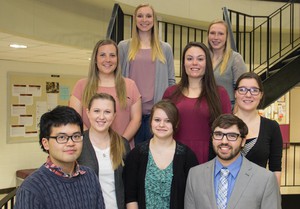Biology Capstone assesses students' research and public speaking skills

CHADRON – Chadron State College’s Biology Capstone (BIOL 499) doesn’t shy away from challenging students. The upper division course is designed to challenge seniors by requiring them to read, interpret and present scientific literature to diverse audiences and synthesize knowledge from their previous years of coursework specifically in science, society and technology. Ideally, it also prepares students for professional school.
Fall 2017 was the first time the course was presented as an Essential Studies Capstone course. Previously it was taught as two one-credit hour courses named Biology Seminar I and Biology Seminar II, according to Physical and Life Sciences Department Chair Dr. Wendy Jamison, who alternates team teaching the course with other Biology faculty.
“We have incorporated more focus on societal, ethical, and historical considerations of science in the course [as a capstone],” Jamison said. “The most successful students will thoroughly demonstrate that they have achieved all of the student learning objectives of the biology program.”
According to Jamison, students tend to choose a scientific topic three different ways. The topic might be applicable to their future career or related to something they have observed while shadowing a professional, it may have been introduced in one of their courses or it may be a condition that affects a family member or friend.
May 2017 CSC graduate Bethany Bergstrom said the course was one of the most challenging, yet rewarding classes she took. Bergstrom’s presentation was about Manchurian ash tree’s resistance to emerald ash borer.
“It left a memorable impact of accomplishment and pride in what I had been taught by the Biology department,” she said. “It gave me the opportunity to show my professors what I had learned and internalized from each of their classes through my papers and presentations. I showed I was able to read research articles from a number of journals, synthesize the information under my thesis, and present a coherent argument with research data supporting my claims. I gained tremendous confidence in my abilities.”
As a graduate research assistant at University of Nebraska-Lincoln pursuing a master’s degree in Entomology, Bergstrom found the CSC course a perfect introduction for developing a master’s thesis.
“I am now able to read hundreds of research articles over my project, elucidate what is important to my project, and correlate the different conclusions into a single coherent argumentative idea. I will be taking an Entomology Seminar course in the Fall 2018 semester and know I am prepared,” Bergstrom said.
She plans to continue her education and eventually obtain a Ph.D.
Shelbey Nagle, a CSC graduate pursuing her Doctor of Veterinary Medicine degree, said the course allowed her to integrate the knowledge she learned throughout lower level courses and apply it to a topic she is passionate about: beef cow reproduction, specifically embryo transfer.
“The course challenged me to think past direct regurgitation limitations and truly learn and apply the knowledge I was gaining. For me, the refinement of public speaking skills was an added bonus. Completing Biology Seminar I and II is directly relevant to vet school because we will have to complete a similar project during our senior year. After completion of Biology Seminar, I am confident in my ability to select a topic I am passionate about, integrate information, and present my findings professionally,” Nagle said.
Category: Campus News, Physical and Life Sciences, Student Awards & Achievements
